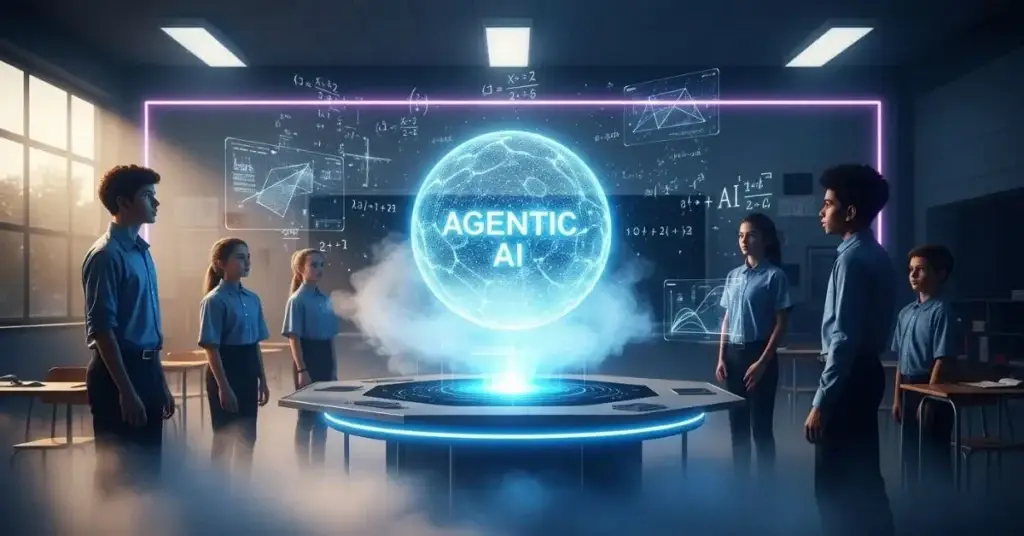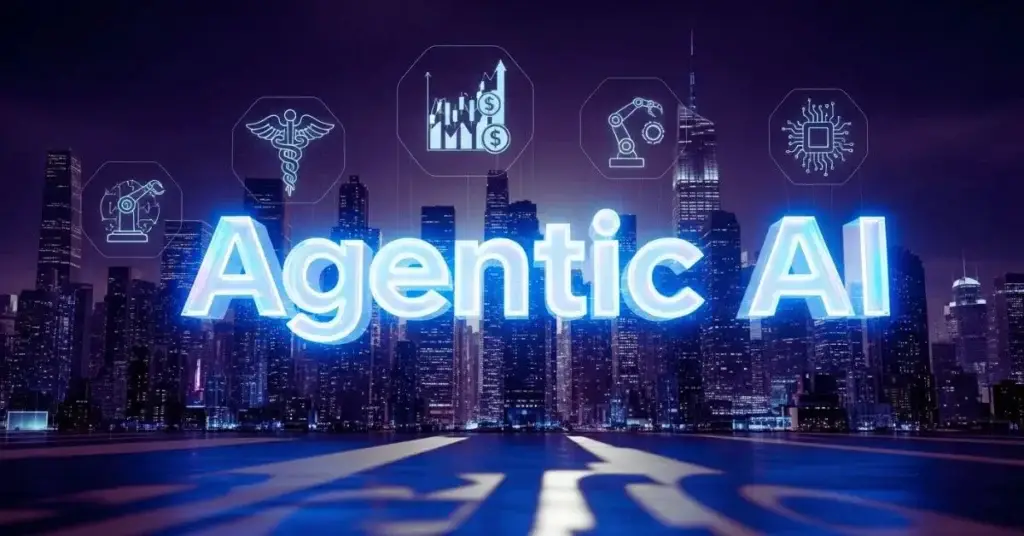
Introduction
Agentic AI is rapidly becoming one of the most important breakthroughs in artificial intelligence. Unlike traditional AI systems that only respond to prompts, Agentic AI acts autonomously, sets goals, reasons about decisions, and executes tasks independently.
This shift represents innovation and a competitive necessity for businesses in the USA across healthcare, finance, e-commerce, and education. If companies ignore it today, they risk falling behind in tomorrow’s economy.
What is Agentic AI?
Agentic AI refers to autonomous AI systems that can plan, decide, and act without constant human supervision. “Agentic” comes from “agency,” meaning the ability to make choices and act.
Unlike traditional AI tools like chatbots or generative text models that wait for human prompts, Agentic AI systems proactively move forward. They can manage workflows, execute tasks in multiple steps, and collaborate with other digital agents.
Key Features of Agentic AI
- Autonomy: Works independently without needing every instruction.
- Reasoning: Evaluates multiple options before acting.
- Goal-Oriented: Doesn’t just answer—it pursues objectives.
- Learning: Continuously improves through data and feedback.
- Adaptability: Adjusts strategies when the environment changes.
In short, Agentic AI is not just reactive like a chatbot but proactive like a digital employee capable of decision-making.
Why Agentic AI Matters for the USA in 2025
The United States is already the global hub for artificial intelligence, but the competition is fierce. With billions of dollars invested into AI startups and government initiatives like the National AI Research Resource (NAIRR), the USA is racing to secure its leadership. Agentic AI is emerging as the competitive edge in this race.
Key Reasons Agentic AI is Crucial in the USA
- Economic Competitiveness: China and Europe are investing heavily in autonomous AI systems. Adopting Agentic AI isn’t optional for American companies; it’s a matter of survival.
- Productivity Boost: A McKinsey report suggests that AI could add $4.4 trillion to the global economy annually. Agentic AI supercharges productivity by automating complex workflows.
- Healthcare Transformation: From AI-powered diagnostics to patient monitoring, Agentic AI agents are helping hospitals across the USA reduce costs and save lives.
- Financial Efficiency: Fraud costs American businesses billions annually. Agentic AI can autonomously flag unusual transactions in real-time, reducing losses.
- Military & National Security: Defense research in the USA increasingly focuses on autonomous AI for cybersecurity and robotics.
FOMO Factor: Companies that delay adoption risk losing market share, investors, and talent to competitors already deploying Agentic AI.
How Does Agentic AI Work?
Agentic AI operates through a cycle of reasoning, planning, and execution.
The Process in Four Steps
- Goal Setting: The AI system defines or receives a goal (e.g., “Research top 10 competitors in renewable energy”).
- Reasoning: It analyses multiple options and selects the most efficient path.
- Execution: The AI agent runs web searches, generates reports, and sends emails.
- Feedback Loop: It reviews results, learns from them, and improves future performance.
Real-Life Examples of Agentic AI in the USA
Healthcare
- Mayo Clinic is experimenting with AI-powered medical assistants to make faster diagnoses.
- Virtual nurse agents are guiding patients post-surgery.
- Predictive AI agents forecast chronic illness risks before symptoms emerge.
Finance
- Goldman Sachs and JP Morgan are testing AI trading agents.
- Fraud detection agents flag suspicious credit card activities in real time.
- Compliance bots scan thousands of legal documents daily.
E-Commerce
- Amazon uses agent-like AI to optimise supply chains.
- Personalised recommendation engines act as shopping concierges.
- Autonomous agents manage dynamic pricing strategies.
Education
- Universities like MIT are exploring AI tutors that adapt to each student’s learning style.
- Research agents compile scientific data, saving months of human work.
For a deep dive into how Agentic AI is transforming schools, colleges, and online learning in North America, check out our full guide on Agentic AI in Education in the USA and Canada
Benefits of Using Agentic AI
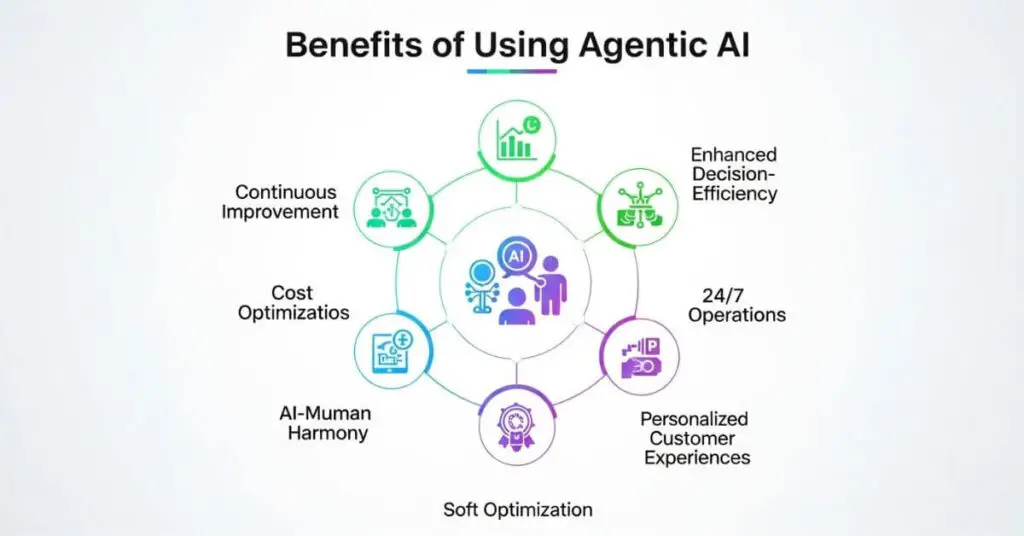
- Cost Savings: Cuts down repetitive, expensive human labour.
- Scalability: Handles thousands of tasks simultaneously.
- 24/7 Availability: Never sleeps, works continuously.
- Accuracy: Reduces human errors, particularly in finance and medicine.
- Speed: Executes in seconds what takes humans hours.
- Competitive Edge: USA businesses leveraging Agentic AI will innovate faster than global rivals.
Challenges & Limitations
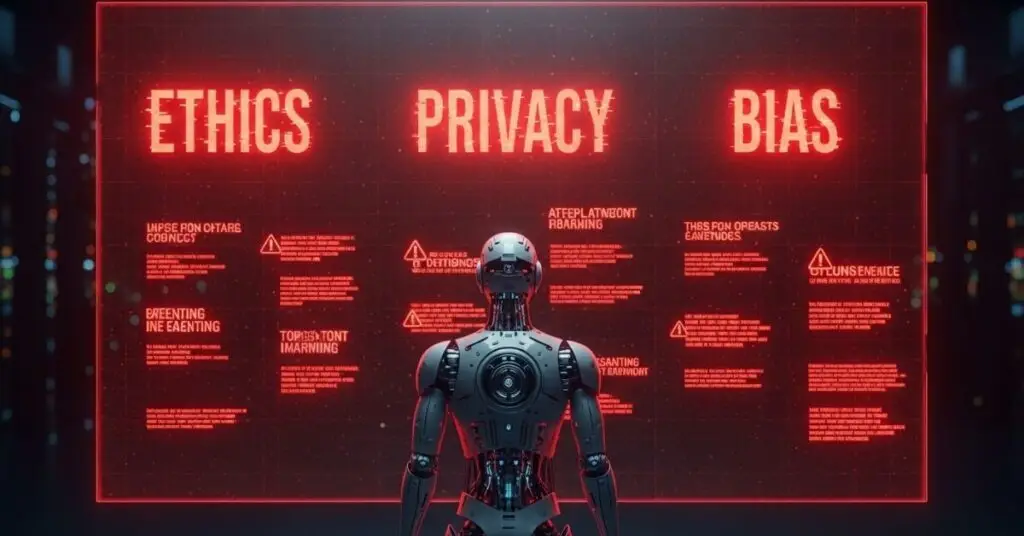
Ethical & Legal Concerns
- Privacy issues when agents handle sensitive health or financial data.
- Potential for bias in decision-making if training data is flawed.
Technical Barriers
- Requires advanced infrastructure and cloud resources.
- Risk of “hallucinations” or wrong decisions if not monitored.
USA Regulatory Landscape
- Congress and the White House are debating the AI Bill of Rights.
- Strict data privacy laws like HIPAA and state-level regulations must be followed.
Agentic AI vs Generative AI
| Feature | Generative AI | Agentic AI |
|---|---|---|
| Role | Creates text, images, code | Plans & executes tasks |
| Nature | Reactive | Proactive |
| Example | ChatGPT writing blog posts | Creates text, images, and code |
| Limitation | Needs prompts | Still developing safety frameworks |
Generative AI is a tool, while Agentic AI is more like a team member that can think and act independently.
How USA Businesses Can Start Using Agentic AI
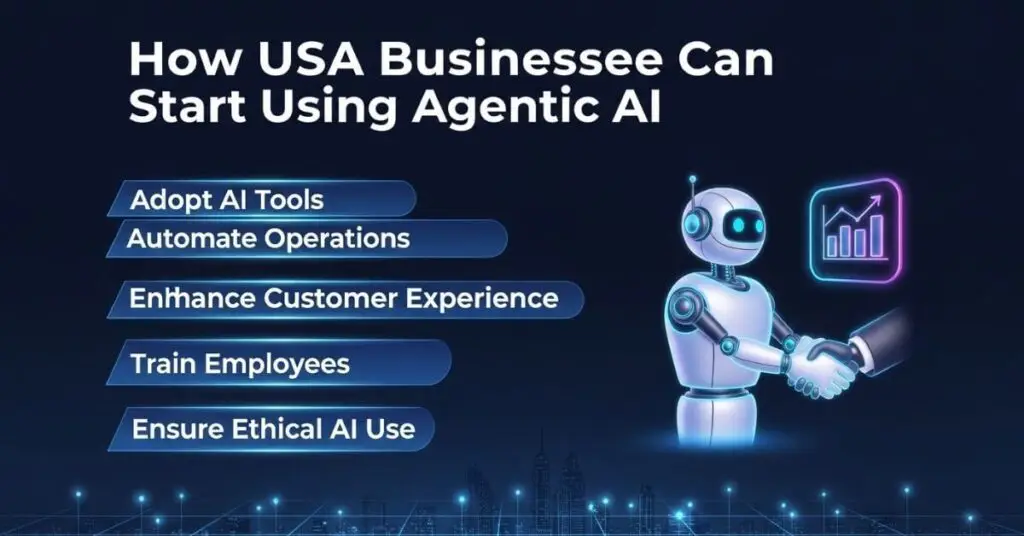
For Startups
- Deploy AI chatbots for customer support.
- Use research agents for competitor analysis.
- Automate social media management.
For Enterprises
- AI-driven RPA for finance and HR workflows.
- Multi-agent project management.
- Intelligent supply chain and logistics systems.
Step-by-Step Adoption Guide
- Identify repetitive tasks that waste human time.
- Choose the right Agentic AI platform (LangChain, AutoGPT, CrewAI).
- Run small pilot programs before full deployment.
- Train employees to collaborate with AI agents.
- Scale gradually while monitoring compliance.
The FOMO Factor: Why You Can’t Ignore Agentic AI
In the USA, venture capitalists are investing billions into Agentic AI startups. Gartner predicts that by 2026, over 30% of new digital products will be developed with the help of autonomous AI agents.
The fear of missing out is real:
- Competitors will launch faster.
- Customers will demand AI-driven services.
- Investors may ignore companies lagging.
Future of Agentic AI in the USA
By 2030, Agentic AI is expected to reshape every industry.
- Healthcare: AI-managed virtual hospitals.
- Finance: Autonomous wealth management services.
- Robotics: AI agents controlling physical robots in warehouses.
- Education: Digital tutors in every American classroom.
- Government: Smart city AI agents optimising traffic, energy, and safety.
The USA workforce won’t disappear; it will evolve. Jobs will shift from repetitive tasks to strategic, creative, and supervisory roles.
Conclusion
Agentic AI is not just another buzzword but a transformative force reshaping industries across the USA. From healthcare to finance, businesses adopting Agentic AI will enjoy faster growth, better efficiency, and a more potent competitive edge.
For American businesses, the real risk isn’t adopting Agentic AI, it’s ignoring it. Those who take action now will lead the AI-driven economy, while those who hesitate risk being left behind.
The question is no longer “What is Agentic AI?” It’s “When will you integrate it into your business strategy?”
FAQs About Agentic AI
Q1. What is Agentic AI, and how is it different from Generative AI?
Answer: Agentic AI refers to AI systems that can reason, plan, and take autonomous actions toward specific goals. Unlike Generative AI (which mainly creates text, images, or videos), Agentic AI actively executes tasks, interacts with digital tools, and adapts in real time. In simple terms, Generative AI produces, while Agentic AI acts.
Q2. Can small businesses in the USA afford to implement Agentic AI?
Answer: Many affordable Agentic AI tools are available through cloud platforms and open-source frameworks. Small businesses can start with pilot projects, automate repetitive workflows, and scale later. ROI usually comes from time savings, efficiency, and reduced operational costs.
Q3. What are the security risks of Agentic AI?
Answer: Agentic AI, like any AI, poses risks such as:
- Data privacy leaks
- Unauthorised tool usage
- Biased or unintended decisions
Businesses in the USA must set strict access controls, monitoring systems, and compliance checks to reduce these risks.
Q4. How is Agentic AI regulated in the USA?
Answer: The USA has no federal law for Agentic AI. Still, businesses must follow existing data protection rules (like HIPAA in healthcare and FTC guidelines for consumer protection). New regulations are under discussion, so companies adopting Agentic AI should also implement internal governance and ethical review frameworks.
Q5. What tools or platforms are used for building Agentic AI systems?
Answer: Popular tools for building Agentic AI systems include:
- LangChain (for chaining reasoning steps)
- AutoGPT & BabyAGI (for autonomous agents)
- LangGraph (for multi-agent coordination)
- OpenAI & Anthropic APIs (for intelligence layer)
These platforms are widely used in the USA for research, startups, and enterprise solutions.
Q6. Which industries benefit most from Agentic AI in the USA?
Answer: Industries adopting Agentic AI fastest in the USA are:
- Healthcare – patient data analysis & treatment planning
- Finance – fraud detection & compliance checks
- E-commerce – personalised shopping & customer support
- Logistics – innovative supply chain management
- Education – adaptive tutoring & research support
Q7. What are the ethical challenges in deploying Agentic AI?
Answer: The main ethical issues are:
- Bias in decision-making
- Accountability (who is responsible for AI actions?)
- Transparency (explainability of reasoning steps)
To follow EEAT standards, businesses must ensure auditability and fairness in their Agentic AI systems.
8. How does Agentic AI handle decision-making and reasoning?
Answer: Agentic AI follows a cycle of:
- Goal setting – understands the task
- Reasoning – plans the steps logically
- Execution – takes action using tools or APIs
- Learning – adapts based on results
This makes it closer to human problem-solving than traditional AI.
Q9. Will Agentic AI lead to job losses or workforce changes in the USA?
Answer: Agentic AI will transform jobs, not just replace them. Routine tasks may be automated, but new roles will emerge in AI oversight, prompt engineering, and agentic system design. Experts suggest that U.S. workers should focus on AI collaboration skills rather than fear job losses.
Q10. How can USA businesses begin integrating Agentic AI into their workflows?
Answer: Steps for businesses in the USA:
- Start with small pilot projects (like automating reporting)
- Use no-code/low-code AI tools for quick adoption
- Build internal policies for security & governance
- Scale gradually across departments
Q11. What is the cost and ROI timeframe for implementing Agentic AI projects?
Answer: Cost varies based on scale, but many businesses start with pilot projects worth $5,000 to $50,000. ROI often appears within 6–12 months through automation, reduced errors, and improved decision-making.
Q12. How explainable and auditable are Agentic AI systems?
Answer: Agentic AI systems are being designed with audit logs, traceable reasoning chains, and explainable steps. This allows businesses in the USA to comply with regulations and build trust with customers.
Q13. What are the future trends of Agentic AI in the USA?
Answer: Future trends include:
- Wider adoption in healthcare and finance
- Multi-agent collaboration for complex tasks
- Integration with robotics and IoT
- Stronger AI governance and regulations
By 2030, experts predict Agentic AI will be as common in businesses as today’s cloud computing.

